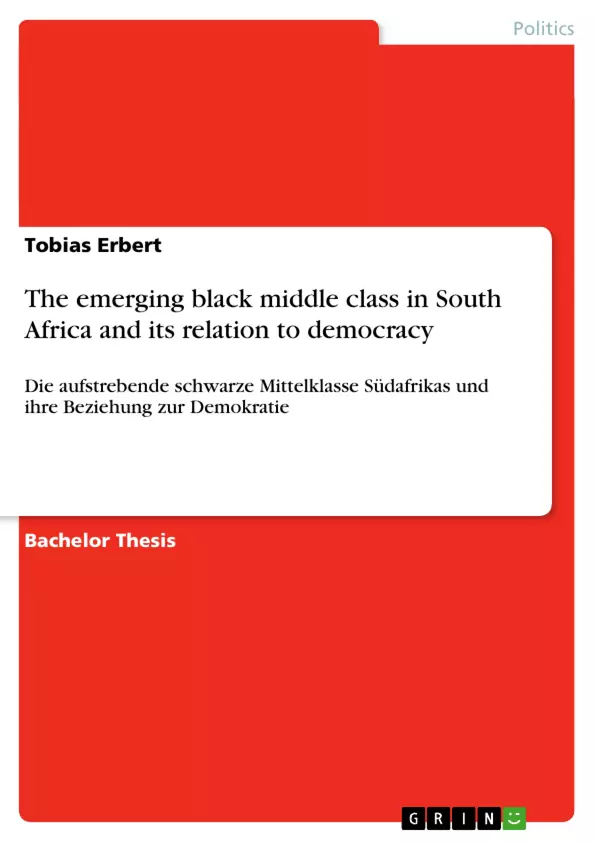19 years after the promising democratic change in South Africa, the countries
challenges and disparities remain ubiquitous. The huge majority of black South Africans
still lives in poverty, inequality has grown since the end of apartheid, service delivery is
a permanent problem and democratic institutions are at least partly weak (Holden
2012: 95).
However, the new South Africa is not only signified by the aggravation of disparities.
Over the last years, the emergence of a black middle class became steadily more
tangible and is today a mostly undisputed phenomenon (Schrire 2005: 271; Southall
2004: 539; Everatt 2011: 79). Some research has been conducted especially to
determine definition criteria and the size of a black middle class (Rivero et al. 2003;
Southall 2004; Visagie, Posel 2011; Phadi, Ceruti 2011). The total middle class in South
Africa included 29% black South Africans in 1994, while until 2011, their share had
grown to 49.8% of the total middle class (Holden 2012: 226-227). In absolute numbers,
the black middle class made up five million people in 2011 (Visagie, Posel 2011: 8, 17)
while South Africa had a total black population of around 41 million people (Statistics
SA 2011). Hence, approximately 8.2% of the black population group belongs to the
black middle class.
Although there is research discussing the size of the black middle class in South Africa,
neither exists a comprehensive knowledge about the black middle class' attitudes
towards democracy nor is there a profound analysis to which extent the black middle
class may contribute to democracy (Everatt 2011: 79-80; Southall 2004: 528). In order
to narrow these obvious research gaps, this study asks the following research
questions:
1) How does the emerging black middle class in South Africa understand
democracy? And
2) How can the relation between the emerging black middle class and democracy be assessed or rather does the emerging black middle class in South
Africa contribute to the strengthening of democracy in the country? [...]
Inhaltsverzeichnis (Table of Contents)
- South Africa at the crossroad: continuing the democratic path?
- Theoretical prerequisites: middle class and democracy
- Emerging black middle class
- Democracy
- Relation between middle class and democracy
- Methodology: A qualitative approach
- Qualitative data collection
- Qualitative data analysis
- The emerging black middle class in South Africa and democracy
- Understanding of democracy
- What kind of relation?
- Conclusion: a promising relation
Zielsetzung und Themenschwerpunkte (Objectives and Key Themes)
This study aims to investigate the relationship between the emerging black middle class and democracy in South Africa. It focuses on understanding the black middle class's perception of democracy and how this emerging class may contribute to the strengthening of democracy in the country.
- The emerging black middle class in South Africa and its characteristics
- The role of the black middle class in the development of democracy
- The potential relationship between the black middle class and democratic institutions
- The challenges and opportunities for democracy in South Africa
Zusammenfassung der Kapitel (Chapter Summaries)
The first chapter discusses the ongoing challenges facing South Africa, highlighting the disparities and inequality despite the promising democratic transition. It also introduces the emerging black middle class and explores its growth in recent years. The second chapter delves into the concepts of an emerging black middle class and democracy, clarifying their meanings and outlining the theoretical framework for the study. It also discusses the relationship between middle class and democracy in previous research. The third chapter explains the methodological approach employed in the study, focusing on the use of qualitative data collection and analysis. The fourth chapter examines the black middle class's understanding of democracy in South Africa and assesses the relationship between this class and the country's democratic institutions.
Schlüsselwörter (Keywords)
The study focuses on the relationship between the emerging black middle class and democracy in South Africa. Key terms and concepts explored include emerging black middle class, democracy, democratic institutions, inequality, social change, and South Africa's political landscape.
Frequently Asked Questions
How has the size of the black middle class in South Africa changed since 1994?
In 1994, black South Africans made up 29% of the total middle class. By 2011, this share grew significantly to 49.8%, representing approximately five million people.
What percentage of the total black population in South Africa belongs to the middle class?
Based on 2011 statistics, approximately 8.2% of the total black population group in South Africa belongs to the black middle class.
What are the primary research questions of this study?
The study focuses on two main questions: 1) How the emerging black middle class understands democracy, and 2) How their relationship with democracy can be assessed in terms of strengthening the country's democratic institutions.
What methodology is used to investigate the black middle class and democracy?
The study employs a qualitative approach, utilizing qualitative data collection and analysis to narrow the research gap regarding the political attitudes of the emerging middle class.
What are the key themes explored in this research?
Key themes include the characteristics of the emerging black middle class, their role in democratic development, the relationship between middle class and democratic institutions, and the challenges facing South African democracy.
- Arbeit zitieren
- Tobias Erbert (Autor:in), 2013, The emerging black middle class in South Africa and its relation to democracy, München, GRIN Verlag, https://www.grin.com/document/264670



